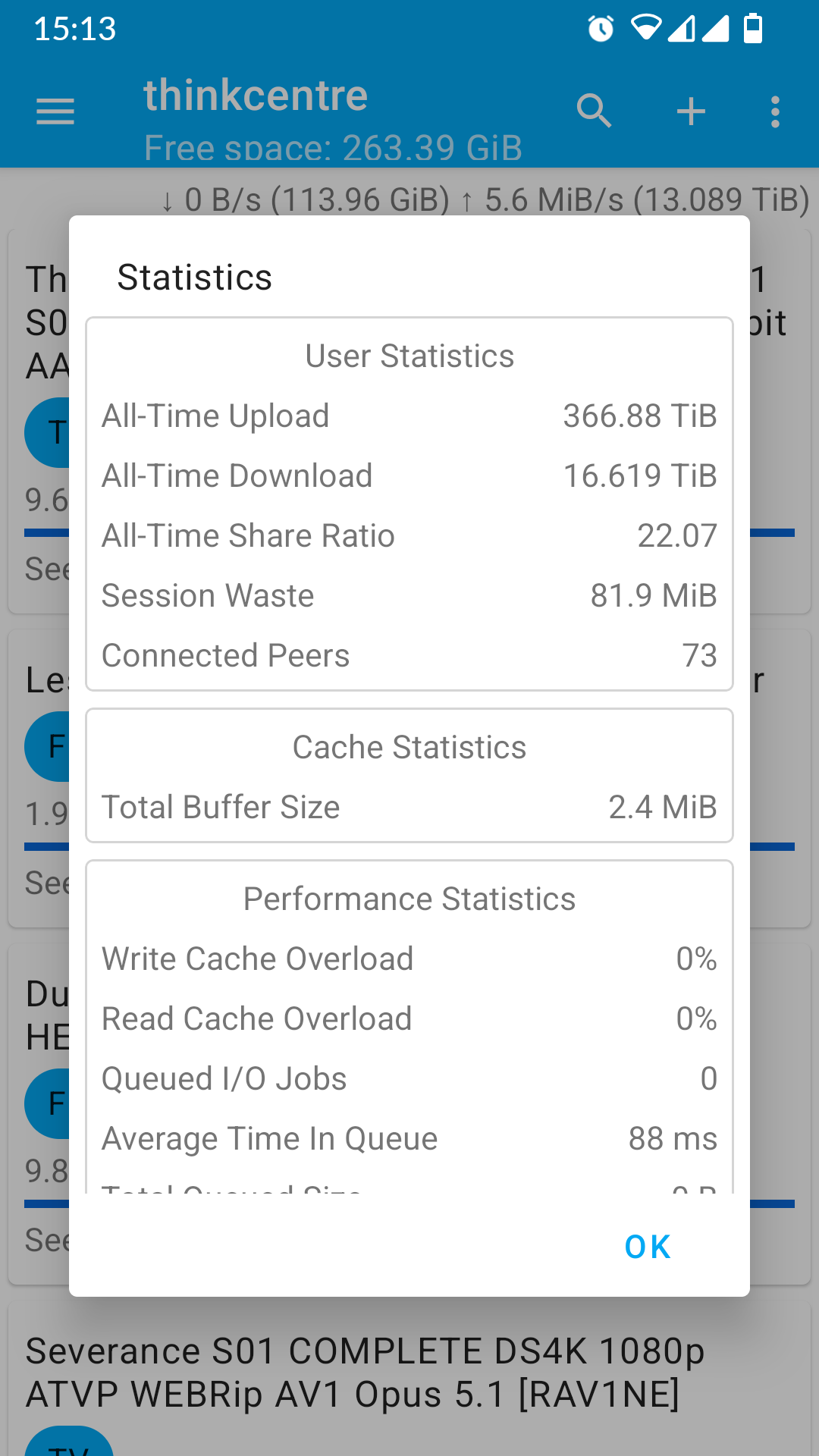

celles-ci sont pipes.sh
- 0 Posts
- 31 Comments
Other than linking in the filesystem as Grippler said (took me a while to understand soft and hard links on linux but they’re soo useful); you can create categories with a default location (e.g. /qbt/-TV, /qbt/-Films), so you only need to pick a category when adding a torrent, and “Automatic Management mode” should save it to the right folder automagically. Also if you don’t like the names you can rename both items in the torrent list and/or their corresponding foldernames and filenames, I do all this from qbittorrent (probably doable with other software as well).


Apparently the issues are mostly with the outgoing download links from libgen.rs and .st (passing through libgen.lol), including the IPFS links which were being problematic in the past few months already.
Instead I just tried something from libgen.gs which is the one for comicbooks, and it’s downloading fine from the direct link.
Thankfully most if not all content should be backed up on Annas-archive!
Oh sorry, can’t think of an easy solution then. I’ve seen that audiobookshelf can find metadata for you, that could be doable. They also support ebooks but if I understood correctly from their docs they don’t get synced to the audio position, just to themselves.
A promising but still in beta software is Storyteller, under very active development here. It works by creating a ‘rich’ epub that contains the audio synced line by line, which you can then read/listen to with just one app.
There’s also older software with a similar approach like syncabook but at a glance it seems less usable than Storyteller.


HDD usually don’t have a limited number of writes like SSD do, if they are robust, maybe enterprise units, they can last a long time.
In a home environment some prefer using slower (5400 vs 7200), non-enterprise hard drives, maybe fewer drives with higher capacity, to reduce noise, power consumption and improve cooling (in enterprise settings this stuff is standardized and they don’t care about noise, in my custom pc I might have forgotten to use the vibration dampeners or I mounted the disks vertically…every white box is different).
Also there are big differences between different models and makers. If they’re cheap enough those helium filled enterprise drives can be one of the best options!
Those big files like .m4b (b stands for book) should have chapters within it, if you open them with mpv on your pc you should be able to see them on the time bar. On Android I’ve been using Voice, it’s really well polished and shows a big chapter name so I usually remember where I was if I switch devices, even if not to the exact minute.
I figured out how to encode to a single m4b in fre:ac so I only use Voice now (or my ipod, which was the reason why I learned how to use fre:ac).
I know you asked for syncing (one day I’ll try adding the audiobook plugin to my jellyfin), but this works for me.
If you prefer a folder of files, you can use fre:ac or many other encoders/tools to split them up.


Hi there, it looks like Journeys is considered the 23rd season of Pokemon (wikipedia says so too), I found it on TMDB: https://www.themoviedb.org/tv/60572/season/23
From a quick look on wikipedia, looks like AC3 does not support VBR. That is enough to make AAC twice as good at least, especially since movies have a lot of silence in them, so your ratio of 1:2 equivalence seems right to me
Hi Zedstrain If compressing, why not opus? AAC is almost as good but you have to make sure you’re using a good encoder, and its licensing is not as open.
Anyway I found this table, next to “Music Storage”, it shows the suggested bitrate values depending on the number of audio channels, from 96 to 450. Should applicable to movies, and to AAC (maybe adding 10% bitrate?).
For movies I’d use these values personally:
2 channels: kbps 128 (150 AAC)
6 (5.1): 196 (224 AAC)
8 (7.1): 256 (300 AAC)


Nope everything usually just works, wine-mono takes care of .NET stuff. Take a look at the optional dependencies for wine (archlinux example), many of those lib32 libraries may be needed.
Cutting edge game-specific fixes that are not yet on normal system wine (especially for a stable distribution with an older wine package) might be on wine-ge that you can install from Lutris, and optionally use for a game or set as the default runner for all new games.


If you’re pirating, don’t use those lutris install scripts, they download directly from the original source like Steam or GOG.
Instead add a game on Lutris by clicking the + button, tell it to install from an executable (.exe), give it a title (if it corresponds to the name on lutris.net, it will download the cover art for you), pick a folder (which by default will be a new wine prefix folder just for this game), select the installer. Proceed as if you were on windows, exit after finishing installation so lutris will know you’re done installing. Your game will be ready to double click :)


AFAIK this shouldn’t change your system, it only activates it, you need to find another way to upgrade/reinstall to a different Windows version. Idk how because I always did clean installs, and for many years now I only use Enterprise LTSC (on a usb ssd with WinToUSB, my internal ssds only have linux).


It’s all about having the .lrc file, it gets read automatically (as long as it’s named like the song file) by mpv player and many android players.
It’s a simple text file containing the lyrics with timestamps. You can get them from deezer for example with certain downloaders. Or look for them on Soulseek.


Thanks for these infos, it’s very interesting to get a glimpse of what goes on behind the “scene”. Makes what you do even more impressive, keep it up 🙂
And I’m sure if dwarfs gets more popular and well maintained, it’ll get distributed more, so it’s not an issue. Also after commenting here yesterday I tried a quick tiny game (Jetstream) on a debian install and saw that dwarfs release on github comes with a dwarfsextract package that’s usable standalone, no installation required, in a few minutes I was playing the game’s exe bypassing the script.


Appreciate the response, I guess my point of view is of a patientgamer, that would not add extra pacman repos just to check out a game…
But I see how you guys have/want to keep up with the cutting edge to offer serious competition, and so from there the need of standardization and not doubling of the efforts makes perfect sense
I’m probably in the minority of gamers, but in the majority of linux users, and most of those that I know even forget they can play casually on their machine and instead rely on consoles or secondary pcs for fear of breaking their main system
In any case your collection is incredible, so if it makes people interested in installing a rolling distro and avoid that windows partition or closed up console, that’s a huge win in my book. Thumbs up 👍🏻👍🏻


I like their work a lot but I wish they didn’t use dwarFS, simply because it’s not easily installable on most distros.
They suggest Arch or other very up-to-date distros to play their games (and it’s true that you get the best experience with the latest AAA games) but in reality 90% of their releases are tiny indie games (that they insist on compressing with dwarFS) or older games that’d run very well even on a Debian oldstable, it’s a pity they’re kinda cutting out a lot of potential users
Lately I’ve been playing only small games on my laptop, I’ve been getting the windows gog releases (freegogpcgames.com) and installing them into Lutris, it’s super convenient


This is true but if you open tens of websites as many people do every day (some keep them open for months!), what kind of monstrous VPN setup should you have to have tens of IPs?
I don’t think there’s a realistic solution other than using TOR as much as you can bear…
CookieAutoDelete and Temporary Containers fool 99% of websites and trackers, especially with uBlock Origin it’s the best you can get without losing convenience…IMHO


1337x is my favorite. Look for efficient encodes like HEVC or AV1 for a better quality/size ratio (and ideally AAC or opus for audio). It’s usually in the torrent name as well as the resolution, source, etc.